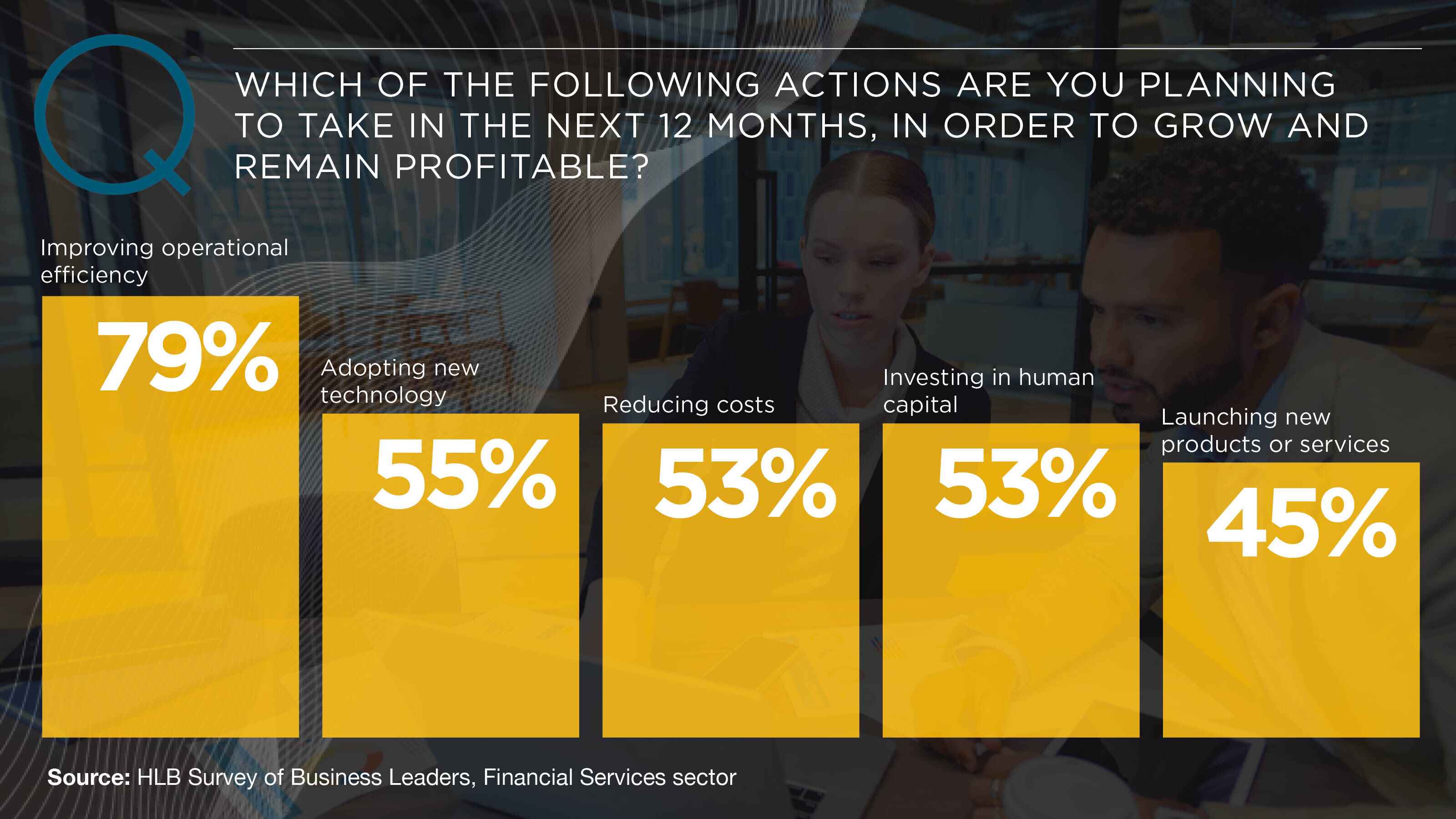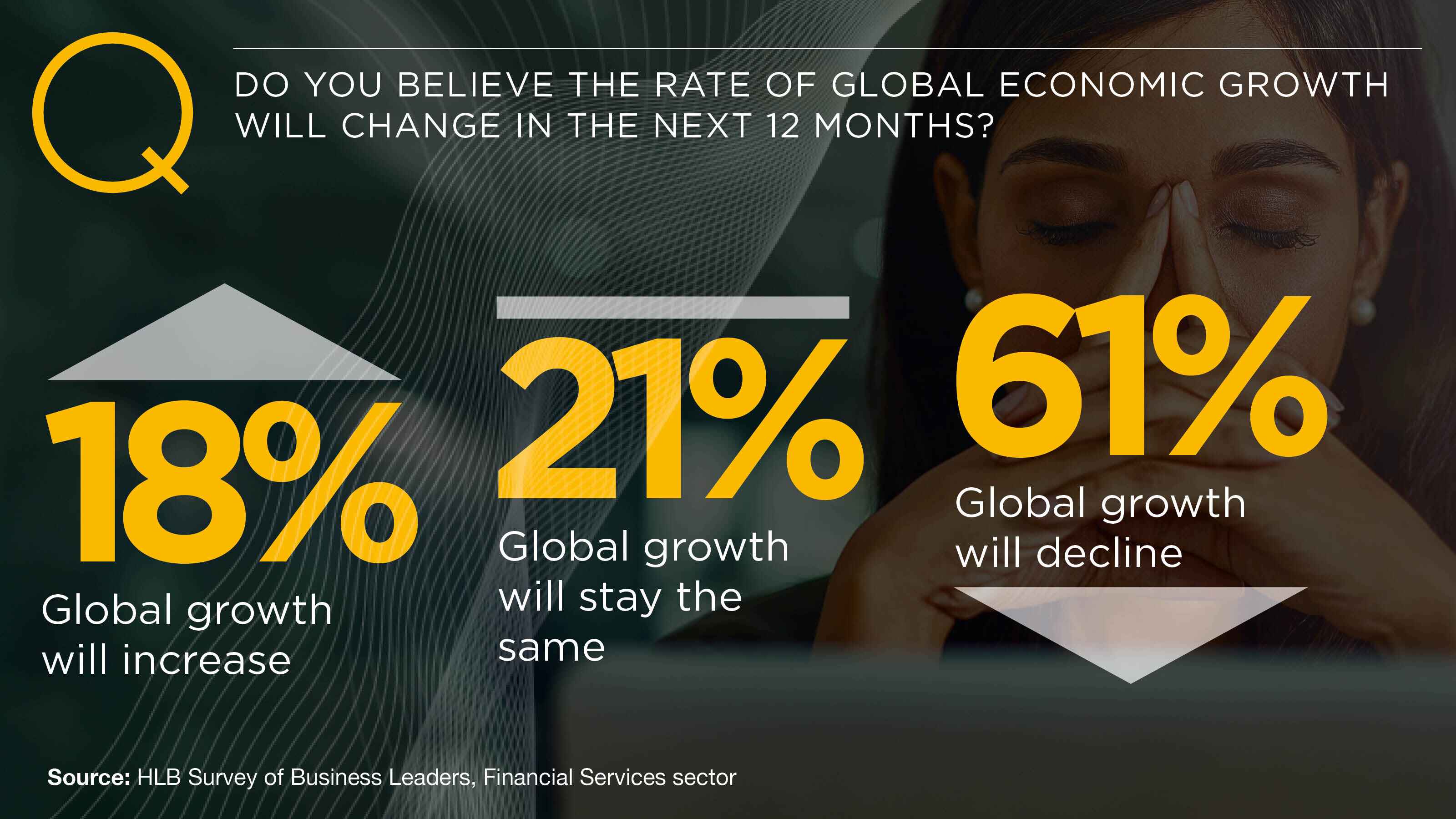Weathering the storm
Financial Services Sector Outlook - HLB Survey of Business Leaders 2023Key insights from the financial services sector:
- 61% expect global growth to decline in 2023. 83% believe inflation is the top concern for the sector.
- 56% are focusing on a combination of short-term and long-term priorities to survive
- 60% are simultaneously focusing on accelerating the adaptation of new technology while also improving workforce productivity.
- 42% are rethinking their ESG responsibilities.
The global economy continues to remain volatile as businesses face several significant risks, according to the Survey of Business Leaders 2023. Inflation, economic uncertainty, geopolitical risks, rising resource costs, rising interest rates, access to talent, and exchange rate volatility are the main concerns that companies have expressed in terms of their outlook for the future.
Of all these risks, inflation was found to be the most concerning, with 82% of respondents indicating their acute apprehension related to it. Economic uncertainty came in a close second at 79%, followed by geopolitical risks at 74%, rising resource costs at 71%, rising interest rates at 64%, access to talent at 61%, exchange rate volatility at 60%, and cybersecurity issues also at 60%.
This data speaks volumes about today's global economy's increasingly unpredictable and volatile nature. Businesses must stay on top of these trends to remain competitive in a world where one wrong move can lead to dire consequences. Inflation has been an issue for decades now, and its effects have only grown more pronounced due to increased consumer demand and higher prices for essential resources like energy and food commodities. Economic uncertainty continues to plague many countries in both developed and developing economies. Geopolitical risk is another factor that needs consideration when making business decisions due to its ability to stir up international tension or alter diplomatic relationships.
A spotlight on financial services

The global financial services sector is facing a rather uncertain outlook for the coming years, as economic expectations have been greatly muted this year. Data from top sources shows that 61% of businesses in this sector expect a decline in global growth in 2023. Inflation has been identified as their biggest area of concern, with 83% identifying it as the top risk they face.
Despite this challenging landscape, there is an optimistic outlook among those in the sector. 81% of survey respondents have expressed confidence about the ability of their companies to grow revenue over the next 12 months. This optimism is reflected in the fact that 79% of financial service providers plan to improve operational efficiency and remain profitable while growing simultaneously.
This survey has highlighted an important issue for global business leaders - the need for investment in talent management and acquisition and increased focus on operational effectiveness.
In addition to this, it is important for companies to understand that securing their data and systems requires more than simply investing in technology solutions – there must also be sufficient investment in training employees on security protocols and regularly updating software systems while also monitoring potential threats. Investment in these areas can help companies build and maintain a solid defense against malicious cyber threats, allowing them to remain competitive in an ever-evolving digital world.
Short-term v long-term
Our study revealed that 56% of financial services companies are adapting their focus on short-term and long-term goals to survive, and 34% are shifting their focus solely toward long-term goals to thrive. Furthermore, 60% of the sector are making simultaneous efforts to accelerate new technology adoption and improve workforce productivity.
56% have also taken the initiative to modify their human resource models to prepare for the future of work. Additionally, 47% have established a succession plan for the upcoming 5-10 years, aiming to ensure that their company's success continues even after present leadership is no longer involved. Such forward thinking ensures that these companies can move forward with confidence during times of crisis and anticipate any impending challenges and opportunities that may arise in the near future.

Leading for the future
Leadership behaviors are more important now than ever in times of crisis. The financial service sector ranked integrity and flexibility at 45% each as the top two essential leadership behaviors to emulate in 2023.
Flexibility is essential when making strategic decisions and lower-level actions such as talent acquisition, digital capabilities improvement, and supply chain management.
By demonstrating a flexible mindset to changes in strategy, leaders can ensure their teams stay connected and motivated throughout difficult times. Additionally, honest and transparent dialogue with employees regarding roles and expectations will build trust between both parties and ensure everyone remains on track with objectives.
Leadership flexibility is also paramount for future planning as it allows for quick changes when necessary. Leaders must remain agile to respond quickly to changing circumstances.
Integrity should always be at the heart of any leader's decision-making process. This means consistently being honest, open, and transparent in all communication with employees, customers, and stakeholders. Additionally, leaders need to ensure that they consider the needs of all those involved when making decisions and considering alternatives. This could include soliciting input from both internal and external sources to ensure all perspectives are taken into account before settling on any given strategy or solution.
40% of leaders rated compelling communication one of the three most important leadership skills in this sector. Leaders need to have a well-defined purpose underpinned by a set of values, which helps them meet stakeholders' expectations, like customers, employees, and shareholders. In times of hardship, it is possible to change this purpose or corporate narrative, provided it is done transparently and honestly.
For leaders to use compelling communication effectively, they need to make sure their message is clear and rich with meaning. It should be engaging and inspiring, allowing stakeholders to understand their objectives quickly and accurately. Leaders should provide more details and facts than usual when communicating to better understand the situation or the desired outcome.
Sustainable thinking
Environmental, Social, and Governance (ESG) accountability is an expectation today. Our research found that 69% of financial services believe climate risks will increase in the next five years, while 27% of them agree they are making progress towards becoming carbon neutral in the same period of time.
Furthermore, 55% of the leaders surveyed within the sector focus on improving business performance and its ESG impacts. This illustrates the importance of industry leaders on profits and ethical considerations such as avoiding harm to the environment or preserving public health. That being said, 45% expressed concern or very concern about the risks posed by climate change and environmental degradation to their business over the long term.
The need for companies to adopt ESG policies is becoming more pressing each day as customers become more conscious about where they should invest their money. These practices ensure greater operational efficiency from a financial point of view and provide peace of mind for stakeholders who want to ensure their investments are aligned with responsible practices that benefit society in general. Firms must focus on developing strategies that improve their ESG credentials if they hope to remain competitive in today's market.
Despite regulatory expectations on ESG reporting being largely met by 45% of financial services companies, there still needs to be greater understanding and compliance with new standards. This is evidenced by the fact that only 44% of respondents clearly know the requirements, suggesting a lack of preparation or knowledge amongst some firms.
In addition to meeting the expected regulatory standards, 27% of financial services are attempting to meet wider stakeholder expectations regarding their ESG responsibilities. However, even this effort appears to be lacking - only 42% are rethinking their position in this area.
These figures appear to be at odds with the words of one European CEO who has spoken out about his company's commitment to sustainability and social responsibility. This CEO pledges that his firm will "contribute to a sustainable world, reduce our own ecological footprint, commit to supporting local investments, and invest in employee welfare." Yet, whilst such ambitions should be celebrated and encouraged across the entire sector, our data indicate that a significant proportion (40%) still limit themselves to simply adhering to required ESG actions.
Given the importance of sustainability and corporate social responsibility in today's society, it is vital that more businesses become inspired by those leading the way and actively engage in wider efforts toward creating a better world for future generations. We must continue striving for ever higher levels of ESG engagement amongst global leaders to truly impact our planet's future health and well-being.
How HLB can help
Our research has highlighted the increasing importance of ESG policies for financial services firms. Today's stakeholders want to invest with companies that focus not only on profits but also on being mindful of their operations' environmental and social impact.
This is evidenced by many companies actively engaging in efforts to create a better world for future generations. It is clear that the financial services sector must continue striving for ever higher levels of ESG engagement to impact the planet's future health and well-being.
HLB are ready to help you reduce your carbon footprint and the environmental impact of your business. Contact us today to find out more about our sustainability advisory service.
Sector outlooks

Learn more about our research





